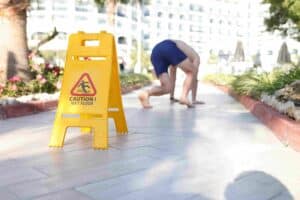
Recent statistics show that Texas ranks among the top states for reported injuries in hotels and resorts, highlighting the pressing need for individuals to understand their rights in such situations.
Imagine this: You’ve been looking forward to a relaxing vacation at a luxurious hotel or resort, only to find yourself injured due to a preventable accident. In the aftermath, you must be aware of your legal rights to ensure fair compensation and hold responsible parties accountable for their negligence.
Here, you can learn about your legal rights and the remedies available if you have sustained injuries while staying at a hotel or resort. Knowing how the law protects you can significantly affect your recovery and financial stability, whether it’s a slip and fall, a swimming pool accident, or food poisoning.
It is also wise to consult with a premises liability lawyer to help ensure your rights are protected.
Duty of Care: The Legal Responsibility of Hotels and Resorts
Hotels and resorts are legally obligated to uphold a duty of care towards their guests. Understanding this concept is essential for individuals seeking legal recourse after sustaining injuries during their stay.
Application of Duty of Care to Hotels and Resorts
Under Texas law, the duty of care requires hotels and resorts to take reasonable measures to ensure guest safety. This includes maintaining safe premises, properly training staff, and promptly addressing potential hazards.
Legal Obligations of Hotels and Resorts
Hotels and resorts are responsible for providing a safe environment for their guests. They must conduct regular inspections, implement security measures, and comply with relevant building codes and regulations.
Examples of Duty of Care Breaches
- Slip and Falls: Failure to promptly clean spills or repair uneven surfaces can result in slip and fall accidents.
- Inadequate Security: Insufficient security measures, such as broken locks or lack of surveillance, can lead to criminal acts and harm guests.
- Swimming Pool Accidents: Failure to supervise properly, maintain pool equipment, or secure the area can result in drowning or other pool-related accidents.
- Foodborne Illness: Poor food handling practices or failure to address health code violations can cause guests to suffer from food poisoning.
Legal Remedies for Duty of Care Breaches
Injured guests may be entitled to legal remedies when a hotel or resort fails to fulfill its duty of care. These can include compensation for medical expenses, pain and suffering, lost wages, and other damages resulting from the injuries sustained.
Types of Injuries in Hotels and Resorts
Guests may be exposed to various injuries when staying at hotels and resorts. Understanding these potential risks is crucial for individuals seeking to protect their rights and seek appropriate compensation.
- Slip and Falls: Slip and fall accidents are among the most common injuries in hotels and resorts. They can occur due to wet floors, uneven surfaces, inadequate lighting, or failure to maintain walkways and staircases in a safe condition. These accidents can lead to fractures, head injuries, and other severe consequences.
- Swimming Pool Accidents: Hotels and resorts often feature swimming pools for guests’ enjoyment. However, negligent maintenance, lack of proper supervision, or failure to provide warnings can result in drowning incidents, slips and falls around the pool area, or injuries from faulty pool equipment. Such accidents can lead to catastrophic injuries or even fatalities.
- Food Poisoning: Guests may suffer from foodborne illnesses when hotels and resorts fail to adhere to food safety regulations. Improper food handling, inadequate refrigeration, or contamination can result in bacterial infections, gastrointestinal issues, and other serious health consequences.
The Potential Severity of Injuries
Injuries sustained in hotels and resorts can range from minor to severe, depending on the circumstances. Slips and falls can lead to broken bones, concussions, or spinal cord injuries. Swimming pool accidents may cause near-drowning incidents, traumatic brain injuries, or permanent disabilities. Food poisoning can result in severe dehydration, organ damage, or even death in extreme cases.
Importance of Documentation and Prompt Medical Attention
If you are injured in a hotel or resort, it is crucial to document the incident and seek medical attention promptly. Documenting the injury through photographs, written reports, and witness statements can provide crucial evidence for your case. Seeking medical attention ensures your well-being and creates a medical record linking your injuries to the incident, strengthening your claim for compensation.
Establishing Liability: Who Can be Held Responsible?
When injuries occur in hotels and resorts various parties may be held responsible for the harm suffered by guests. Understanding who can be held accountable for negligence and premises liability is important.
- Hotel Management and Staff: Hotel management, including owners, operators, and supervisors, can be held liable for injuries if their negligence or failure to fulfill their duty of care directly contributed to the incident. Also, hotel staff members responsible for maintaining safety, such as janitors or security personnel, may be held accountable for their negligent actions or actions.
- Third-Party Contractors: Hotels often hire third-party contractors for maintenance, construction, or security services. If an injury occurs due to the negligent actions of these contractors, they may also share liability for the incident.
Legal Principles of Negligence and Premises Liability
Negligence is a key legal principle in personal injury cases. To establish negligence, the injured party must show that the responsible party owed them a duty of care, breached that duty, and caused injuries due to negligent actions or inactions. Premises liability refers to the legal responsibility of property owners or occupiers to maintain safe premises for visitors.
Impact of the Guest-Hotel/Resort Relationship on Liability
The relationship between the injured guest and the hotel or resort can influence the determination of liability. The legal status of the guest is crucial.
Guests can be classified as invitees, licensees, or trespassers, each with varying levels of legal protection. Hotels owe the highest duty of care to invitees, who are guests on the premises for the hotel’s benefit, while the duty of care is lower for licensees (social guests) and even lower for trespassers.
Additionally, the terms and conditions outlined in guest agreements, waivers, or contracts with the hotel or resort can affect the establishment of liability. However, it’s important to note that such agreements cannot absolve the hotel or resort from liability if negligence or other legal violations occur.
Proving Negligence and Building a Strong Case
Elements Required to Prove Negligence in a Personal Injury Claim: To successfully establish negligence in a personal injury claim, certain elements must be demonstrated:
- Duty of Care: The injured party must establish that the responsible party owes them a duty of care. In the context of hotels and resorts, this duty involves maintaining a safe environment for guests.
- Breach of Duty: It must be shown that the responsible party breached their duty of care. This can involve failing to take reasonable precautions or acting negligently that deviates from what a reasonably prudent person or entity would do in similar circumstances.
- Causation: There must be a direct link between the breach of duty and the injuries suffered. It must be proven that the negligent actions or inactions of the responsible party directly caused the injuries.
- Damages: The injured party must demonstrate that they have suffered actual damages due to the negligent act or omission. These damages include physical injuries, medical expenses, pain and suffering, lost wages, and other related losses.
Guidance on Gathering Evidence to Support Your Case
To build a strong case and prove negligence in a personal injury claim, gathering and preserving relevant evidence is crucial. Some essential pieces of evidence to consider include the following:
- Photographs and Videos: Capture visual evidence of the accident scene, hazardous conditions, and any visible injuries. These images can provide crucial documentation and support your claim.
- Witness Statements: Obtain statements from witnesses who observed the accident or can testify to the conditions that led to your injuries. Their firsthand accounts can strengthen your case.
- Incident Reports: Report the incident to the hotel or resort management immediately. Request a copy of the incident report, which can serve as an official record of the incident and establish the timeline and details of the event.
- Medical Records: Seek medical attention promptly and ensure that healthcare professionals properly document your injuries. Medical records, including diagnoses, treatment plans, and related expenses, can be vital evidence.
- Expert Opinions: Depending on the circumstances of your case, it may be beneficial to consult with experts, such as accident reconstruction specialists or medical professionals, who can provide professional opinions and testimony supporting your claim.
The Importance of Seeking Legal Representation
Navigating the complexities of personal injury claims, including proving negligence and negotiating with insurance companies, can be challenging. Seeking legal representation from a knowledgeable personal injury attorney is crucial. An attorney can guide you through the legal process, protect your rights, gather evidence, assess the value of your claim, and advocate for your best interests, increasing your chances of a favorable outcome.
Protecting Your Rights after an Injury in a Hotel or Resort
Injuries sustained in hotels or resorts can have serious consequences, and it is essential to understand your rights and legal options. This blog post has explored the legal responsibilities of hotels and resorts in Texas, the common injuries that guests may experience, and the importance of establishing liability.
We have also discussed the elements required to prove negligence, the significance of gathering evidence to support your case, and the necessity of seeking legal representation. By knowing your rights, documenting the incident, and obtaining legal assistance, you can protect your rights and pursue fair compensation for your injuries.
Contact us at The Burkett Law Firm at (361) 223-6863 to schedule a free consultation.





